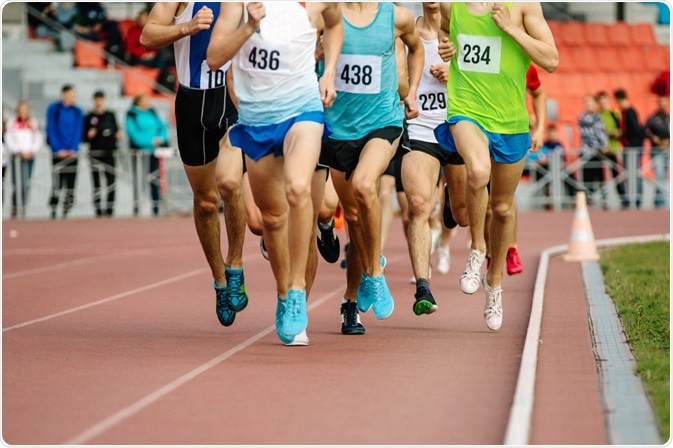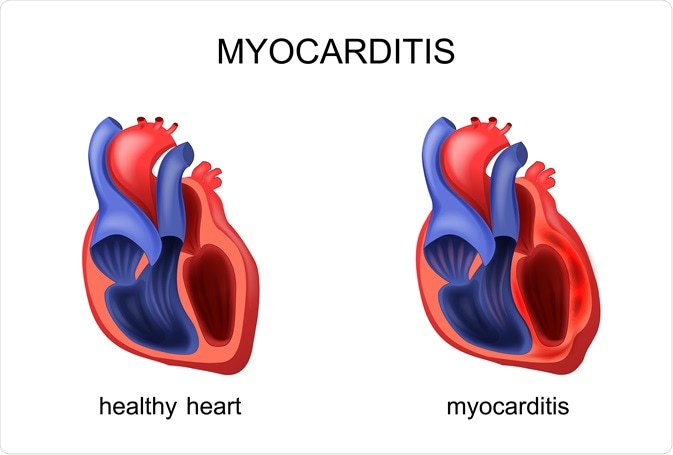COVID-19, although commonly associated with complications to the respiratory system, is increasingly understood to exert a significant impact on the heart and cardiovascular system. Cardiac abnormality including myocarditis has been shown in a large proportion of patients hospitalized for COVID-19.
Given that myocarditis is associated with sudden mortality in athletes, attention has turned to the risk of myocarditis following COVID-19 in athletic and highly active people. Researchers are seeking to establish the effectiveness of cardiac evaluation in stratifying athletes post-COVID-19 infection for fitness to return to training.
 Image Credit: sportpoint / Shutterstock.com
Image Credit: sportpoint / Shutterstock.com
COVID-19 and cardiac complications
The coronavirus disease 2019 (COVID-19) pandemic is a current global disease outbreak caused by a virus belonging to the Coronaviridae family of viruses. As of January 2021, more than 95 million cases have been confirmed globally, with more than two million deaths attributed to COVID-19.
In earlier stages of the pandemic, much attention was focused on acute respiratory complications which increase the risk of mortality and morbidity. However, attention is now turning towards the impact that COVID-19 exerts on the cardiovascular system.
A small, but growing body of research suggests that the disease may exacerbate heart failure in patients with established cardiac conditions. Patients with acute COVID-19 have demonstrated elevated levels of troponin, a protein that is released when the heart muscle becomes damaged, in the bloodstream.
Myocarditis and COVID-19
Myocarditis simply refers to an inflammation of myocardium, or heart muscle. In many cases, myocarditis does not cause symptoms, meaning accurate prevalence in the population is difficult to calculate. When symptoms do occur, it causes fatigue, breathlessness, and arrhythmia. In acute cases, it may lead to heart failure or sudden death.
Myocarditis is usually caused by a viral infection, such as SARS-CoV-2. Coronaviruses are known to bind to angiotensin-converting enzyme (ACE-2), an enzyme that helps modulate a protein known as ANG II, which is implicated in blood pressure and inflammation. When the virus binds to ACE-2, its function is inhibited, and more ANG II is available to damage tissue.
Myocarditis can also occur following the ‘cytokine storm syndrome’ observed in some severe cases of COVID-19. In this condition, the production of cytokines that signal an immune response becomes accelerated, leading to widespread systemic inflammation. The incidence of myocarditis following severe COVID-19 infection is striking. Estimates suggest 60-80% of those discharged following hospitalization for COVID-19 show ongoing myocarditis.
 Image Credit: Artemida-psy / Shutterstock.com
Image Credit: Artemida-psy / Shutterstock.com
Myocarditis and athletes
Given that myocarditis is a leading cause of sudden cardiac death among athletes, concerns over the risk of COVID-19 myocarditis in athletes have led to calls to evaluate athletes recovering from COVID-19 for myocarditis using magnetic resonance imaging (MRI) techniques.
One recent case series took MRI scans of 26 collegiate athletes who had tested positive for COVID-19, 12 of whom displayed mild symptoms and 14 of whom were asymptomatic. None of the participants had required hospitalization for their COVID-19 symptoms. Of the participants, cardiac MRI identified myocarditis was identified in 15% of the sample with a further 31% showing fibrosis of the cardiac tissue.
Although the authors could not draw any conclusions about the long-term consequences of myocarditis in athletes, they suggested that cardiac MRI could offer a useful tool post-SARS-CoV-2 infection to identify high-risk athletes from those safe to resume training and competition.
Following the publication of this study, the American College of Cardiology issued guidance for return-to-play for athletes and highly active people. It suggested that those with mild to moderate symptoms after a positive COVID-19 test should only resume training after complete symptom cessation and thorough cardiac biomarker and MRI evaluation.
However, a subsequent study published in January 2021 evaluated a larger cohort of athletes who had tested positive for COVID-19, using cardiac MRI, EEG, and serum markers of cardiac pathology. 145 competitive athletes with either mild to moderate or no symptoms were assessed approximately 15 days post-positive test result. Only two had MRI findings consistent with myocarditis, leading the authors to conclude that its incidence following COVID-19 was much less prevalent than previously thought.
Researchers from Vanderbilt University Medical Center (VUMC) in a soon-to-be-published study found a similar prevalence. The team compared COVID-19-positive athletes to healthy controls and healthy athletes and found only 3% of those who had tested positive had myocarditis.
However, none of the other screening tests they completed (including serum biomarkers, EKG and EEG) revealed any abnormalities, ruling out the possibility of using these simpler and more traditional screening methods. The authors concluded that cardiac MRI following COVID-19 is a useful tool for assessing athlete fitness prior to a return to sport.
References
- Maron, B. J., Haas, T. S., Ahluwalia, A., Murphy, C. J., & Garberich, R. F. (2016). Demographics and Epidemiology of Sudden Deaths in Young Competitive Athletes: From the United States National Registry. The American journal of medicine, 129(11), 1170–1177. https://doi.org/10.1016/j.amjmed.2016.02.031
- Phelan D, Kim JH, Chung EH. A Game Plan for the Resumption of Sport and Exercise After Coronavirus Disease 2019 (COVID-19) Infection. JAMA Cardiol. 2020;5(10):1085–1086. doi:10.1001/jamacardio.2020.2136
- Puntmann, V. O., Carerj, M. L., Wieters, I., Fahim, M., Arendt, C., Hoffmann, J., Shchendrygina, A., Escher, F., Vasa-Nicotera, M., Zeiher, A. M., Vehreschild, M., & Nagel, E. (2020). Outcomes of Cardiovascular Magnetic Resonance Imaging in Patients Recently Recovered From Coronavirus Disease 2019 (COVID-19). JAMA cardiology, 5(11), 1265–1273. https://doi.org/10.1001/jamacardio.2020.3557
- Rajpal, S., Tong, M. S., Borchers, J., Zareba, K. M., Obarski, T. P., Simonetti, O. P., & Daniels, C. J. (2021). Cardiovascular Magnetic Resonance Findings in Competitive Athletes Recovering From COVID-19 Infection. JAMA cardiology, 6(1), 116–118. https://doi.org/10.1001/jamacardio.2020.4916
- Zheng, YY., Ma, YT., Zhang, JY. et al. COVID-19 and the cardiovascular system. Nat Rev Cardiol 17, 259–260 (2020). https://doi.org/10.1038/s41569-020-0360-5
Further Reading
Last Updated: Feb 2, 2021